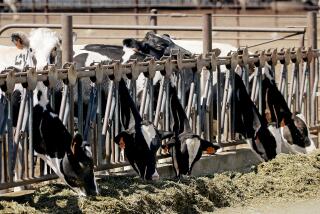Vermonters Turn Up Volume at Town Meetings, Sound Alarm on Runaway Growth
- Share via
MONTPELIER, Vt. — Town Meeting Day is as much a symbol of Vermont as the maple sap that flows soon after, but this year’s town meetings find Vermonters fearful of their state’s future because farms are going out of business and open land is sprouting vacation homes.
“We are losing our farms and we are losing rural Vermont at an unbelievable rate,” says Jack Starr, a dairy farmer from Troy.
The changing Vermont is evident everywhere:
- Vermont has lost more than 300 dairy farms, 10% of its total, in the last two years;
- Average housing values, fueled by competition from affluent out-of-staters, have increased 48% in two years;
- The annual number of applications for development permits has almost doubled in the last six years;
- The number of houses being bought by and built for out-of-staters seeking a vacation retreat is skyrocketing. In 1986, 52% of all new housing constructed in Windham County alone was second homes.
Transportation Networks
The reasons for the development pressure are simple: Improved transportation networks have brought Vermont closer to Boston and New York, a booming economy has provided people with the cash and Vermont’s ski resorts are expanding to become more attractive year-round.
To help preserve farms, some towns are using the limited clout of their annual town meetings, a New England fixture in which residents vote directly on town expenditures and policy. In Pawlet, voters are being asked to exempt farm silos from property taxes, a move that would mean a savings of $200 a year for each of the town’s 17 farms.
“It’s going to be a combination of these little things that keep the farmers going,” said state Rep. Perry Waite of Pawlet. “Do you want New Jersey or do you want a few farms left? I don’t feel we can afford to lose one farm in Pawlet.”
And the Legislature is considering a controversial $40-million package that includes the first-in-the-nation state subsidy for dairy farmers, to offset cuts in federal milk price supports.
“It’s a radical proposal, but these times demand it,” said Rep. Paul Poirier, the Vermont House Democratic leader and chairman of a special House committee on growth.
‘Year of the Farmer’
“This has become the year of the farmer,” said Rep. Michael Bernhardt, the state’s House Republican leader. “Saving farms seems to be something people can identify with as a way to save Vermont.”
The concerns over growth reached a boiling point last fall, prompting Gov. Madeleine M. Kunin to appoint a special Governor’s Commission on Vermont’s Future.
More than 2,000 people attended the commission’s 11 public hearings, with several hundred voicing their fears.
“I don’t see a lot of ‘rural’ going on anymore,” said Peter Saman of Woodstock. “If Vermont is going to be here, I think rural has to exist or we’re going to live in Disneyland.”
Victoria Fraser of Williston told the commission: “I am afraid we will obscure the soul of Vermont by covering her with parking lots, highways and condominiums.”
“Too many Vermonters in towns near major ski areas and tourist centers are feeling like strangers in their own communities, hesitating to go to the grocery store or post office for fear of sitting in traffic or waiting in line,” said Mary McCallum of Proctorsville.
Kunin, armed with the commission’s report, devoted her entire state-of-the-state address in January to detailing “today’s unprecedented growth” and describing her own fears about the changes.
Planning Process
Kunin said the only way to regain control is “to inaugurate a new and tough planning process which will guide Vermont into a future that we envision for ourselves.”
More to Read
Sign up for Essential California
The most important California stories and recommendations in your inbox every morning.
You may occasionally receive promotional content from the Los Angeles Times.










